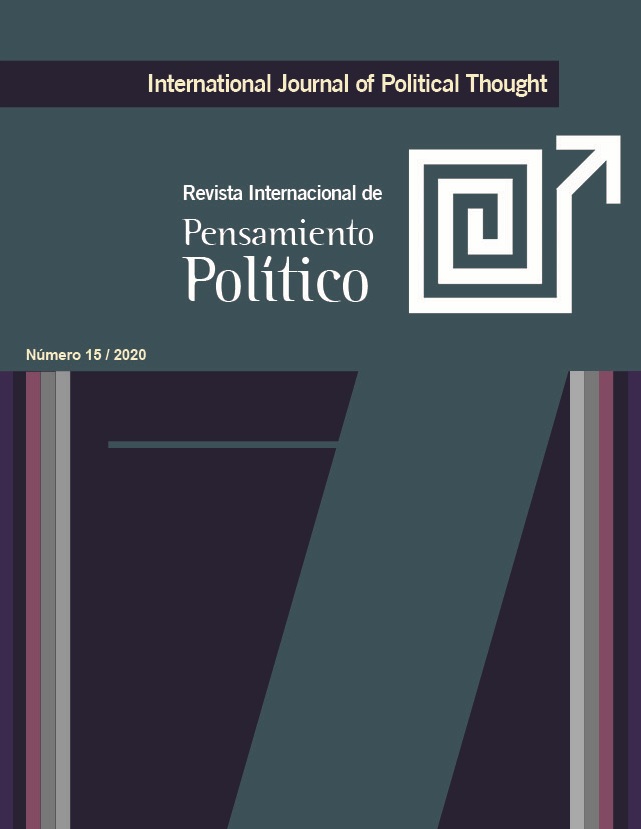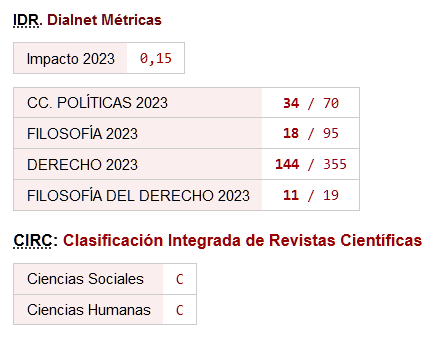The Totalitarian State Theory and the “Principle of Integration of Powers” in the Legal and Political Philosophy of Carl Schmitt
DOI:
https://doi.org/10.46661/revintpensampolit.5605Keywords:
National Socialism, Führerstaat, Totalitarian state, Carl Schmitt, fundamental rightsAbstract
The main intellectual foundations of the law and the State made from the point of the National Socialist legal philosophy, made by the famous german jurist Carl Schmitt. This work addresses, among others, some of Schmitt’s writings which were written during his affiliation with the Nazi party. It will be analyzed the formulation of the Schmittianian totalitarian state theory or the “Führer State” based on its well-known friend-enemy dialectic, and the application of this totalitarian theory as a justification for the crimes committed during the night of the long knives. The role and relevance of the academic world in the foundation and legitimacy of State repression carried out by the Nazi regime.
Downloads
References
AGUILAR BLANC, Carlos. “El influjo del pensamiento de Rousseau, Marat y Robespierre en los fundamentos intelectuales, ideológicos y jurídicos del Terror Revolucionario Francés” en Revista Internacional de Pensamiento Político, Época I, Vol. 5. 2010, pp. 211-237.
AGUILAR BLANC, Carlos, “La Fundamentación teórica del Terror de Estado en la Filosofía Jurídica nacionalsocialista de Karl Larenz” en Revista Internacional de Pensamiento Político, Época I, Vol. 9, 2014, pp. 231-248.
BRAVO REGIDOR, Carlos, CORDOVA VIANELLO, Lorenzo, SERRANO GÓMEZ, Enrique, ¿Por qué leer a Schmitt hoy? Ed. Fontamara. Mexico DF. 2013.
CROCE, Mariano y SALVATORE, Andrea. The legal theory of Carl Schmitt”. Routledge. Taylor & Francis Group, A GlassHouse Book, New York, 2013.
CRUZ PÉREZ, Pablo de la, “Imperio de la racionalidad con arreglo a fines: Análisis desde la actualidad y vigencia de las categorías y conceptos de Carl Schmitt.” En Revista Internacional de Pensamien to Político, I Época Vol. 12, 2017, pp. 369-392.
DUQUE SILVA, Guillermo Andrés. “Rueda suelta entre los nazis: La aversión teórica de Carl Schmitt frente al nazismo”, en Revista Prolegómenos Derechos y Valores. 2015, II, pp. 85-98.
GOMEZ ORFANEL, Germán. Excepción y Normalidad en el Pensamiento de Carl Schmitt, Ed. Centro de Estudios Constitucionales, Madrid, 1986.
KELSEN, Hans., ¿Quién debe ser el defensor de la Constitución? Madrid, Tecnos, 1985.
KELSEN, Hans., Wer soll der Hüter der Verfassung sein? Ed. Mohr Siebeck, Tübingen 2008.
LA TORRE, Massimo.; La “Lotta contra il Diritto Soggetivo”: Karl Larenz e la Doctrina Giuridica Nazionalsocialista, Seminario Giuridico Della Universita di Bologna CXXVII, Dott. A. Giuffre Editore, S.p.A., Milano, 1988.
LARENZ, Karl; “Rechtperson und Subjektives Recht” en Grundfraggen der neuen Rechtswissenschaft, Volumen colectivo de los profesores Georg DHAM, Ernst Rudolf HUBER, Karl LARENZ, Karl MICHAELIS, Friedrich SAFFSTEIN, y Wolfgang SIEBERT. Editado por Junker und Dünhaupt Verlag, Berlin, 1935.
MIGUEL HERRERA, Carlos. “La polémica Schmitt-Kelsen sobre el guardián de la Constitución” en Revista de Estudios Políticos, Nueva Época, Num. 86, OctubreDiciembre 1994, pp. 195-227 (revista española).
NOAKES, Jeremy, y PRIDHAM, Geoffrey. Documents of Nazism 1919-1945, New York, The Viking Press, 1975.
RAMAS SAN MIGUEL, Clara. “El Estado total en Carl Schmitt: desbordamiento de lo político y decisión totalitaria: una reconstrucción teórico-doctrinal” en Res Publica Revista de Historia de las Ideas Políticas. 22(1), 2019, pp. 141-156.
RODRIGUEZ PRIETO, Rafael., “¿Viejo y nuevo decisionismo? Una cierta arqueología del autoritarismo” en Fuentes intelectuales de los neoconservadores americanos. Ed. Aconcagua Libros. Sevilla. 2008.
SARAVIA, Gregorio. “Carl Schmitt: Variaciones sobre el concepto de enemigo”, en Universitas. Revista de Filosofía, Derecho y Política, nº 15, enero 2012, pp. 149-172.
SCHMITT, Carl. “La Revolución Legal Mundial” en Revista de Estudios Políticos, Nueva Época, Núm. 10, Julio-Agosto de 1979, pp. 5-24 (revista española).
SCHMITT, Carl. Positionen und Begriffe: in kampf mit Weimar – Genf – Versailles 1923-1939. Druncker & Humblot, Berlin, 1988.
SCHMITT, Carl. “El concepto de Imperio en el Derecho Internacional” en Revista de Estudios Políticos, Núm. 1, EneroMarzo de 1941, pp. 83-101 (revista española).
SCHMITT, Carl. “La Tiranía de los Valores” en Revista de Estudios Políticos, Núm. 115, Enero-Febrero de 1961, pp. 65-81 (revista española).
SCHMITT, Carl. El concepto de lo político. Texto de 1932 con un prólogo y tres corolarios, Alianza Editorial, Madrid, 1998.
SCHMITT, Carl. La defensa de la Constitución, Ed. Tecnos, Madrid, 1983.
SCHMITT, Carl. La Dictadura. Alianza Editorial, Madrid, 1999.
SCHMITT, Carl. Legalidad y legitimidad. Ed. Aguilar, Madrid, 1971.
SCHMITT, Carl. Legalidad y legitimidad. Ed. Comares, Granada, 2006.
SCHMITT, Carl. Teoría de la Constitución, Alianza Editorial, Madrid, 1992.
TEXTO LEGAL “Verordnung des Reichspräsidenten zum Schutz von Volk und Staat – Vom 28 Februar 1933.
TEXTO LEGAL Gesetz zur Behebung der Not von Volk und Reich [“Ermächtigungsgesetz”] Von 24 März 1933.
WEINREICH, Max. Hitler’s Professors: The Part of Scholarship in the Germany’s Crimes Against the Jewish People. Yale University Press, New Haven, 1999.
ZAFFARONNI, Eugenio Raul. El enemigo en el derecho penal. Ed. Ediar, Buenos Aires, 2006.
Downloads
Published
How to Cite
Issue
Section
License

This work is licensed under a Creative Commons Attribution-NonCommercial-ShareAlike 4.0 International License.
Open access policy
Free and open access is allowed to any interested party to all the contents of the journal issues, free of charge, being able to print and transfer all the articles, with the only condition of specifying the source and authorship.
The journal: a) does not charge authorship costs for the processing of articles or for their submission, b) maintains copyright for authors without restrictions, c) facilitates authors to keep their publication rights without limitations.
The International Journal of Political Thought is an original work of the Laboratory of Political Ideas and Practices of the Pablo de Olavide University. All articles included in the Journal are original work of their respective authors. This Journal is freely offered to the scientific and academic community at no cost and releases the contents according to the license "Attribution-NonCommercial-ShareAlike 4.0 CC BY-NC-SA" of the Creative Commons project available in the following url: https://creativecommons.org/licenses/by-nc-sa/4.0/legalcode
If you wish to translate or compile any of the articles available here, please contact us at contacto












 ISSN: 1885-589X
ISSN: 1885-589X  Universidad Pablo de Olavide
Universidad Pablo de Olavide